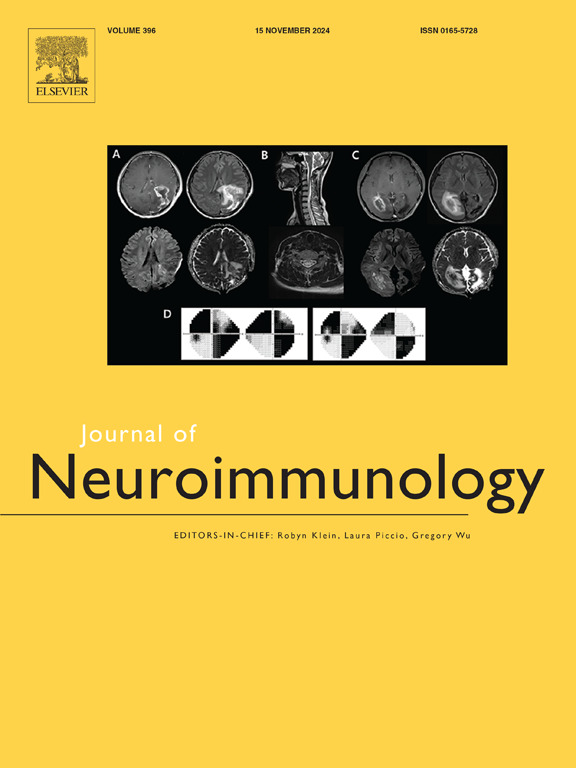Serum levels of tumor necrosis factor and TNFRSF1A gene polymorphisms in Egyptian multiple sclerosis patients: the influence on susceptibility and severity
IF 2.5
4区 医学
Q3 IMMUNOLOGY
引用次数: 0
Abstract
Introduction
Multiple sclerosis (MS) is an autoimmune demyelinating disease of the central nervous system that is caused by a complex interplay of genetic, epigenetic, and environmental factors.
Objectives
To investigate the relationship between serum levels of TNF and TNFRSF1A gene polymorphisms and their impact on the risk and severity of MS.
Methods
This case-control study included fifty patients with multiple sclerosis, both familial and non-familial, and fifty healthy matched controls. Molecular analysis of TNFRSF1A gene variants (rs1800693) was performed using TaqMan Real-Time PCR, and TNF serum levels were measured using ELISA.
Results
The frequency of the (C/C) genotype was significantly higher in patients (16 %) compared to controls (2 %). Additionally, the frequency of the (C) allele in TNFRSF1 (rs1800693) was significantly higher in patients (17 %) than in controls (2 %). The median serum TNF level was significantly higher in controls (79.99 Pg/ml, IQR: 67.39 to 434.48) compared to MS patients (67.93 Pg/ml, IQR: 57.15 to 80.79). Furthermore, the serum TNF level was significantly lower in patients with TNFSF1A gene variants C/C and C/T with a median of 56.31 Pg/ml (IQR: 48.84 to 73.9) compared to patients with TNFSF1A gene variant T/T with a median of 69.26 Pg/ml (IQR: 58.7 to 85.08). A significant negative correlation was found between serum TNF and EDSS in MS patients (r = −0.28, p value = 0.04).
Conclusion
The rs1800693 SNP (C/C) variant is a significant factor in the development of MS. Additionally, the reduced serum TNF levels observed in the carriers of the C allele may contribute to disease pathogenesis.
埃及多发性硬化症患者血清肿瘤坏死因子和TNFRSF1A基因多态性水平:对易感性和严重程度的影响
多发性硬化症(MS)是一种中枢神经系统自身免疫性脱髓鞘疾病,由遗传、表观遗传和环境因素的复杂相互作用引起。目的探讨血清TNF和TNFRSF1A基因多态性水平与多发性硬化症发病风险和严重程度的关系。方法本研究纳入50例家族性和非家族性多发性硬化症患者,以及50例健康对照。采用TaqMan Real-Time PCR对TNFRSF1A基因变异(rs1800693)进行分子分析,ELISA检测血清TNF水平。结果(C/C)基因型在患者中的出现频率(16%)明显高于对照组(2%)。此外,TNFRSF1 (rs1800693)中(C)等位基因的频率在患者中(17%)显著高于对照组(2%)。对照组血清中位TNF水平(79.99 Pg/ml, IQR: 67.39 ~ 434.48)明显高于MS患者(67.93 Pg/ml, IQR: 57.15 ~ 80.79)。此外,TNFSF1A基因变异C/C和C/T患者的血清TNF水平显著低于TNFSF1A基因变异T/T患者,中位数为56.31 Pg/ml (IQR: 48.84至73.9),而TNFSF1A基因变异T/T患者的中位数为69.26 Pg/ml (IQR: 58.7至85.08)。MS患者血清TNF与EDSS呈显著负相关(r = - 0.28, p值= 0.04)。结论rs1800693 SNP (C/C)变异是ms发生的重要因素,C等位基因携带者血清TNF水平降低可能与ms发病有关。
本文章由计算机程序翻译,如有差异,请以英文原文为准。
求助全文
约1分钟内获得全文
求助全文
来源期刊

Journal of neuroimmunology
医学-免疫学
CiteScore
6.10
自引率
3.00%
发文量
154
审稿时长
37 days
期刊介绍:
The Journal of Neuroimmunology affords a forum for the publication of works applying immunologic methodology to the furtherance of the neurological sciences. Studies on all branches of the neurosciences, particularly fundamental and applied neurobiology, neurology, neuropathology, neurochemistry, neurovirology, neuroendocrinology, neuromuscular research, neuropharmacology and psychology, which involve either immunologic methodology (e.g. immunocytochemistry) or fundamental immunology (e.g. antibody and lymphocyte assays), are considered for publication.
 求助内容:
求助内容: 应助结果提醒方式:
应助结果提醒方式:


